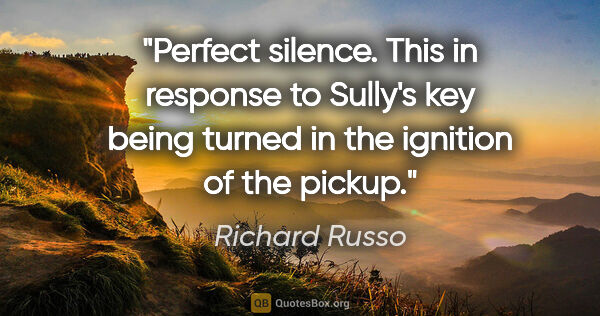Keys Quotes (page 14)
The worst part was that, as the years passed, these memories became, in the way you kept them in a secret box in your head, taking them out every so often to turn them over and over, something like dear possessions. They were the key to your unhappiness. They were the evidence that life wasn’t fair. If you weren’t a lucky child, you didn’t know you weren’t lucky until you got older. And then it was all you ever thought about.
Jeffrey Eugenides


I believe this is so and I'm prepared to vouch for it, because it seems to me that the meaning of man's life consists in proving to himself every minute that he's a man and not a piano key. And man will keep proving it and paying for it with his own skin; he will turn into a troglodyte if need be. And, since this is so, I cannot help rejoicing that things are still the way they are and that, for the time being, nobody knows worth a damn what determines our desires.
Fyodor Dostoevsky
That there would be a political advantage in having the declaration written by a Virginian was clear, for the same reason there had been political advantage in having the Virginian Washington in command of the army. But be that as it may, Jefferson, with his "peculiar felicity of expression," as Adams said, was the best choice for the task, just as Washington had been the best choice to command the Continental Army, and again Adams had played a key part. Had his contributions as a member of...
David McCullough
The key to excellent report writing' he said between chews, 'is to take every bit of passion out of it. Use an extra heaping portion of superflously extraneous tautological redundancies in order to make it mind-numbingly boring. So that when one's superior officers read it, they zone out and start skimming and maybe don't notice the fact that one has been spinning one's wheels since the body turned up and hasn't solved a goddamn thing.
Jonathan Kellerman

Trying to exhaust himself, Vaughan devised an endless almanac of terrifying wounds and insane collisions: The lungs of elderly men punctured by door-handles; the chests of young women impaled on steering-columns; the cheek of handsome youths torn on the chromium latches of quarter-lights. To Vaughan, these wounds formed the key to a new sexuality, born from a perverse technology. The images of these wounds hung in the gallery of his mind, like exhibits in the museum of a slaughterhouse.
J. G. Ballard


